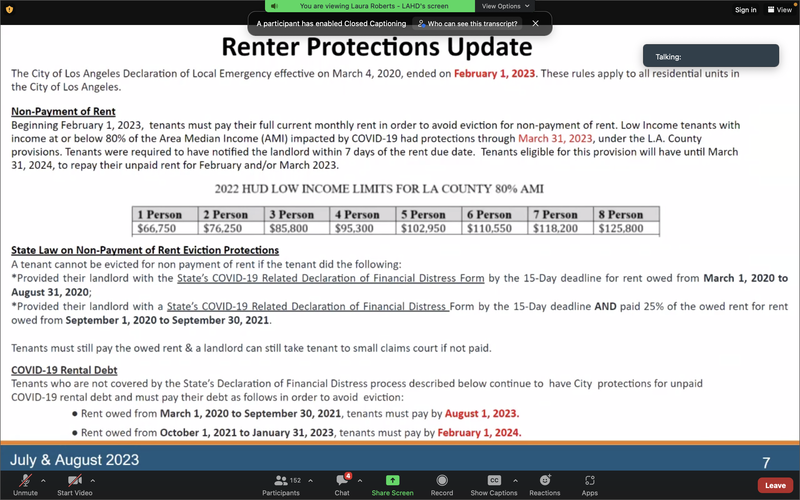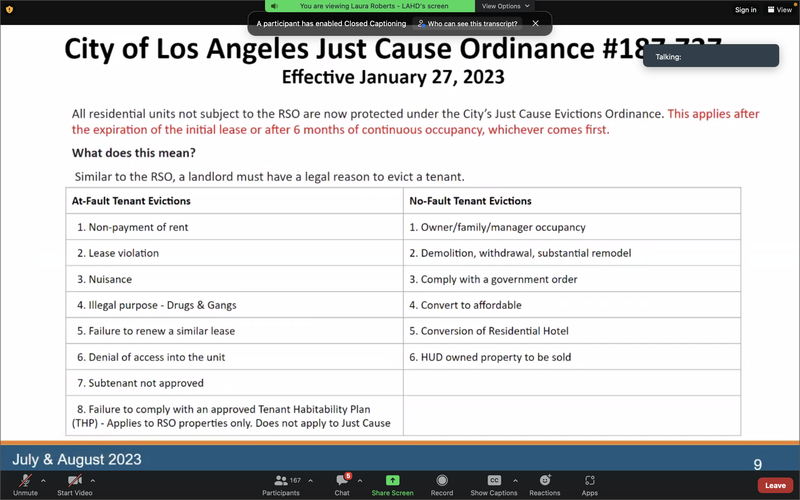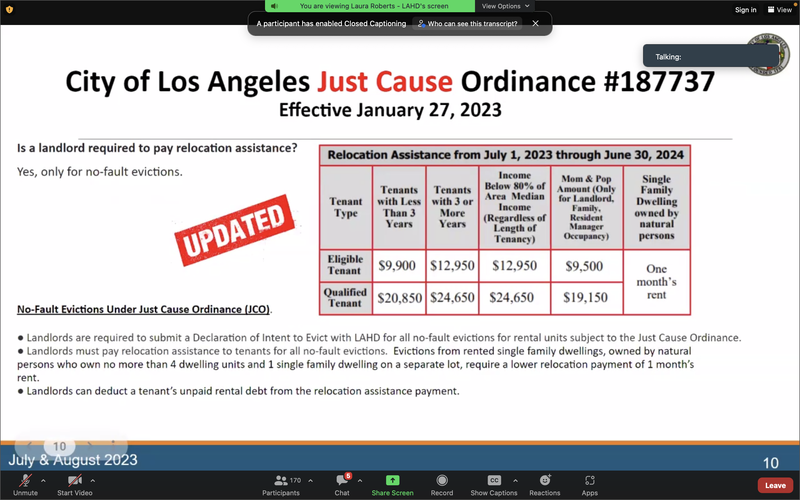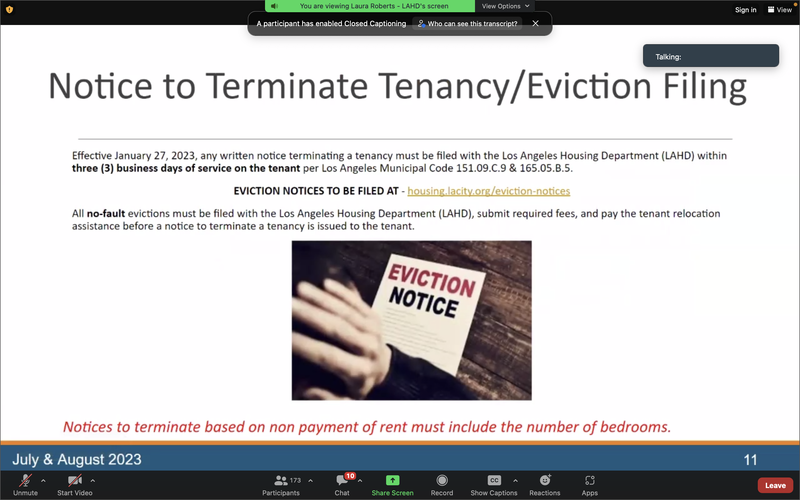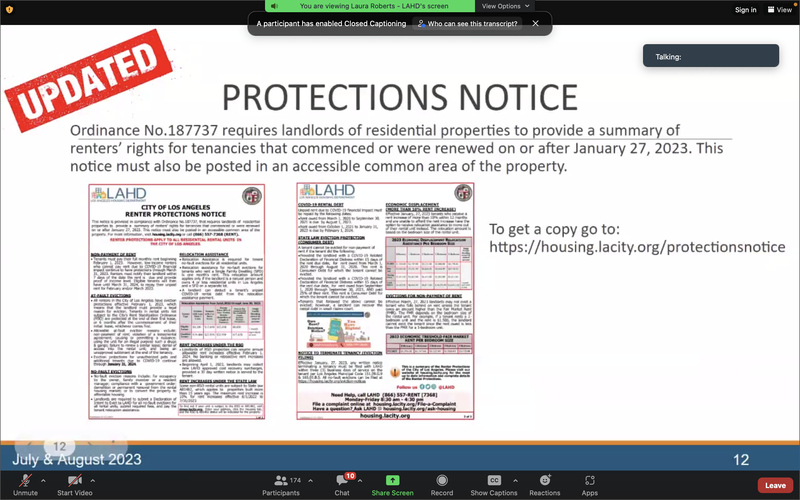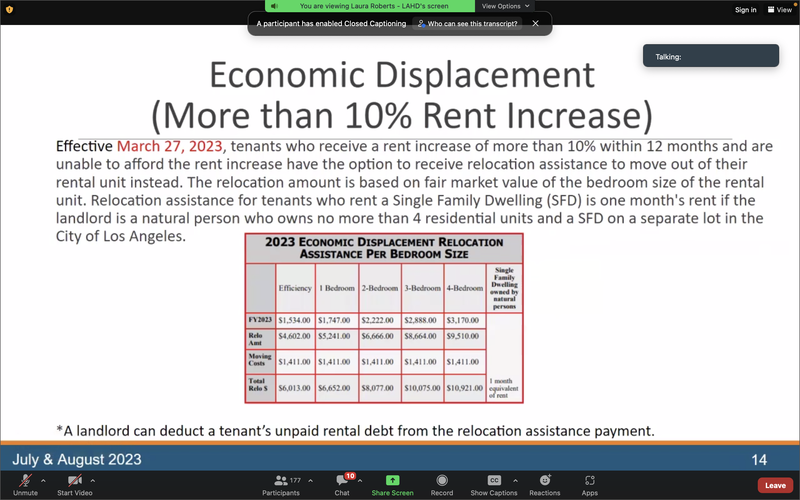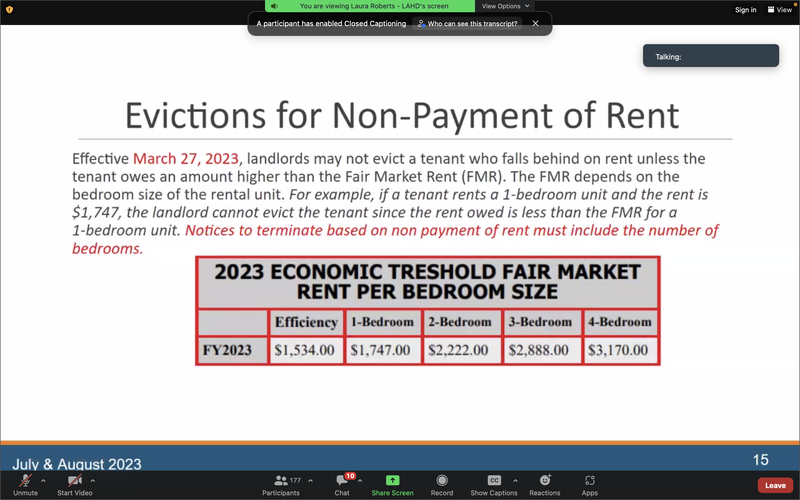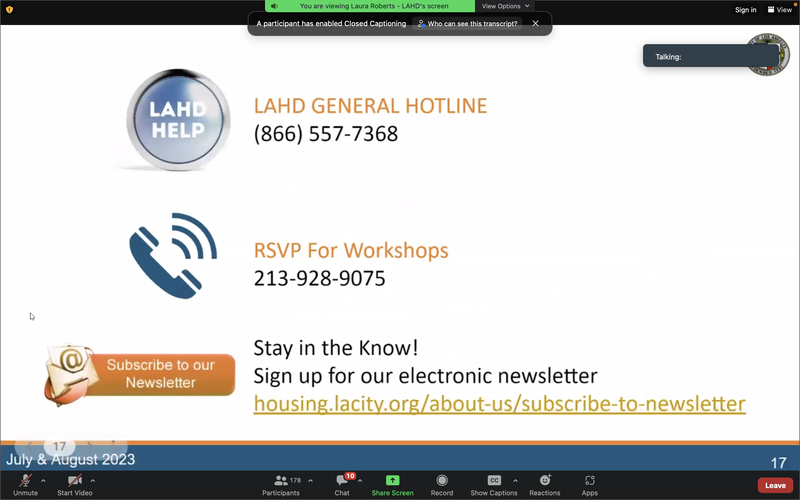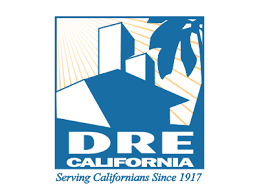|
From KTS Law
1. Question: I was told by my tenant that my notice of increase was bad because it was less than 90 days and was over 10%. I thought it was 60 days for rent increases? Is my tenant correct? Answer: Yes, the tenant is correct in this instance. Beginning in 2020, the Civil Code changed to increase the amount of time from 60 days to 90 days for a rent increase over 10% within the last 12 months. If you mail out the increase within the state of California you need to add 5 days for mailing for a total of 95 days’ notice. 2. Question: In our lease agreements we require tenant’s to pay their rent on the first of the month. If the first falls on a holiday, such as Labor Day, do you have to give the tenant’s until midnight on the second to pay the rent or can you still enforce the late fee as of midnight on the first? Answer: Rent is not delinquent unless one business day has expired from the date the rent is due. So if the first is a weekend or holiday, the rent is not late until after one business day has expired. 3. Question: I own a fourplex. Unit B has two cars, one is broken down. What kind of demands can I place on B about the broken-down vehicle? Answer: You can create a lease term by requiring all vehicles to be in operable condition or they will be towed. To put this into place, you need to either serve a Thirty-Day Notice of Change of Terms to a month-to-month agreement or wait until the lease expires and have the new condition in the renewal lease. If your property is in a just cause area, this may not be an option depending on the local ordinance. 4. Question: I rented a condominium unit to a couple on a year’s lease. After one month, they had to move out to take a job out of state. My daughter wants to move in and that’s all right but she will not be paying me rent. Does the tenant still owe me the rent for the lease? Answer: Under California law, a tenant who vacates early is liable for the remainder of the lease period up until the time the premises are re-rented or otherwise taken back by the landlord. When your daughter moves in, the tenant is relieved from further payment. 5. Question: Can I bill my tenant for excessive water usage if I can prove they neglected to fix two leaky faucets for over three months? Answer: Most rental agreements and California law require the tenant to maintain the premises in good condition and repair. Failure to meet their obligations would therefore be a breach of the lease and you should be able to recover all losses suffered, provided you have sufficient proof. 6. Question: New tenants moved in last month. The wife now wants me to take her name off the lease because she is moving out and getting a divorce. They agreed to a one-year lease. What can I do? Answer: You are not legally required to release the wife from liability under the lease. If you do, and the husband is unable to pay or declares bankruptcy, you would not be able to pursue your losses from the wife. After the initial term lease is over, the wife is no longer liable. 7. Question: What can you do about a tenant being cruel to an animal such as keeping a large dog in small quarters outside with the dog crying in the rain, cold and heat? Answer: You have a right to report any criminal or inhumane acts occurring on the rental property. If the mistreatment constitutes a crime, you could evict the tenant for carrying on illegal activity on the premises. 8. Question: Is a phone text an official written notice for a 30-Day Notice? Answer: No, a text would not qualify. A 30-Day Notice must follow statutory requirements and should be served in the same manner as a Notice to Pay Rent or Quit, personal, sub-service or post and mail, although service by certified mail is permitted by California law.
0 Comments
 A leasing professional who is also involved in property management has "skin in the game" during tenant screening. It means they are more accountable and invested in the process due to their ongoing involvement with the property and its tenants. This situation presents several implications:
For the renter and property owner, there are also several advantages to having the same professional doing leasing and management: Having your leasing professional also manage your property isn’t just a time-saver; it's a strategy for success. Seamless Synergy: When the person who leases your property also manages it, they intimately understand its ins and outs. That means a seamless transition from showcasing the space to handling the day-to-day details of property management. Consistency is Key: One person overseeing both aspects means a unified approach. From screening tenants to maintaining standards, the process remains consistent, ensuring the perfect fit between tenant and property ethos. Communication Champion: Having one point of contact streamlines communication. There's no back-and-forth; it's direct and efficient, ensuring that issues are promptly addressed and tenant relationships are nurtured. Preserving Property Health: A leasing professional who also manages prioritizes the property’s well-being. They’re invested in finding tenants who respect and care for the space, reducing potential damages and fostering a community-driven atmosphere. Elevated Property Value: Long-term tenants contribute to increased property value. When your leasing pro knows how to lease for long-term tenancy and manages with the property’s future in mind, your property becomes a sought-after gem within the community. The Human Touch: It's not just about business; it’s about fostering a community. Having one person handle both roles creates a personal touch. Tenants feel heard and valued, contributing to a positive and harmonious atmosphere. In a nutshell, having your leasing professional also manage your property isn’t just a time-saver; it's a strategy for success. It’s about curating a seamless experience for both property owners and tenants, creating a community that thrives under a shared vision for the property owner's best interests at heart. When one person embodies both roles, they don’t just manage a property; they cultivate a space where tenants feel at home and property owners feel at ease.  As a tenant, you may have heard of a security deposit but may not know what it is. In California, a security deposit equals the cost of one month's rent, paid by the tenant to the landlord before moving in. This deposit can be used by the landlord to cover damages or unpaid rent during the tenant's stay. When the tenant leaves, the landlord must give back the security deposit, minus any needed deductions, within 21 days of the move-out. The landlord cannot keep the entire amount of the security deposit without justification. Deductions can only be made for things like unpaid rent, cleaning fees, or repairs required due to damage caused by the tenant or their guests beyond normal wear and tear. The landlord must provide a detailed list of deductions and receipts for any work done. As a tenant, it's essential to keep a copy of the lease agreement. This will help you to avoid any disputes over the refund of your security deposit. Tenants should leave the property in good condition upon moving out to increase the likelihood of receiving a full refund. In summary, a security deposit is equivalent to 1 month's rent paid by a tenant to cover any damages or unpaid rent during their stay. By law, the security deposit must be returned within 21 days. Remember, as a tenant, it's essential to understand your rights and responsibilities regarding the security deposit. Image by Drazen Zigic Big Changes Ahead: Explaining the Recent LA City Council Vote
On December 5th, the Los Angeles City Council made a significant decision that impacted the way rent increases were calculated for RSO units. The 10-2 vote in favor of passing a new ordinance brings crucial changes that tenants and landlords should be aware of. Decreasing the Allowable Increase One of the most notable changes is the adjustment in the allowable increase. Previously set at 7%, this figure will now decrease to 4% for the period between February 1, 2024, and June 30, 2024. This alteration aims to moderate the rate of rent increases, offering tenants some relief in a challenging housing market. Additional Allowance for Utility Providers Moreover, there's an additional allowance of up to 2% for property owners who provide electricity and/or gas. This incentivizes landlords who offer utilities within their rental units while still regulating the overall rent hike. SCEP & RSO Pass Through Amount As of January 1, 2022, the SCEP fee stands at $67.94 per unit annually & RSO fee amounts to $38.75 per unit annually. Landlords have the right to collect these fees from tenants at a rate of $2.83 & $1.61 per month, spread over 12 months each year. However, this can only be done after the landlord has registered the units and provided proper written notice to the tenant. An Amendment for Small Owners An important amendment, proposed by McOsker and passed as part of Blumenfield’s original motion, demands a report from the Los Angeles Housing Department. This report, expected by December 14, is pivotal in creating a specific definition for "small owners." This definition aims to allow these landlords to take the increase under the original formula of 7%, offering a more balanced approach for smaller property owners. What's Next? This update marks a shift in rent increase regulations, aiming to strike a balance between supporting tenants and acknowledging the needs of property owners. As we await further clarity on the definition of "small owners," it's essential for both tenants and landlords to stay informed about these changes and their implications. Just wanted to let you know: a new Senate Bill that requires homeowners to inspect the standards of a building’s porches, stairways, decks, walkways, & other elevated structures more than 6 feet above the ground.
Senate Bill-721 applies to buildings with three or more multifamily dwelling units. The first inspection must be done by January 1, 2025. Re-inspections are required every six years. The inspections must be performed only by a licensed architect, civil or structural engineer, or a building contractor holding specific licenses as a B General Contractor or C5 Framing. In case you missed the webinar, we've got notes for you!
Main takeaway: RSO units will be allowed to increase the rent 7% on February 1st, 2024; this is subject to change. An additional 1% for gas and 1% for electricity if they landlord is paying for the utilities. A 30 day advanced written notice to the tenant is required. From: https://housing2.lacity.org/residents/rso-overview |
Archives
July 2024
Categories
All
|
Locations |
KEYBOXDRE 02086236About Our Broker: Los Angeles native, with a Bachelor's and Master's from Stanford University.
California Real Estate Broker Exam Perfect Score. |
What Our Clients Are Saying"Keybox is a rare balance of both approachable and professional, always responds quickly and efficiently when I reach out, and I trust the Broker completely. Highly recommended!!" |

